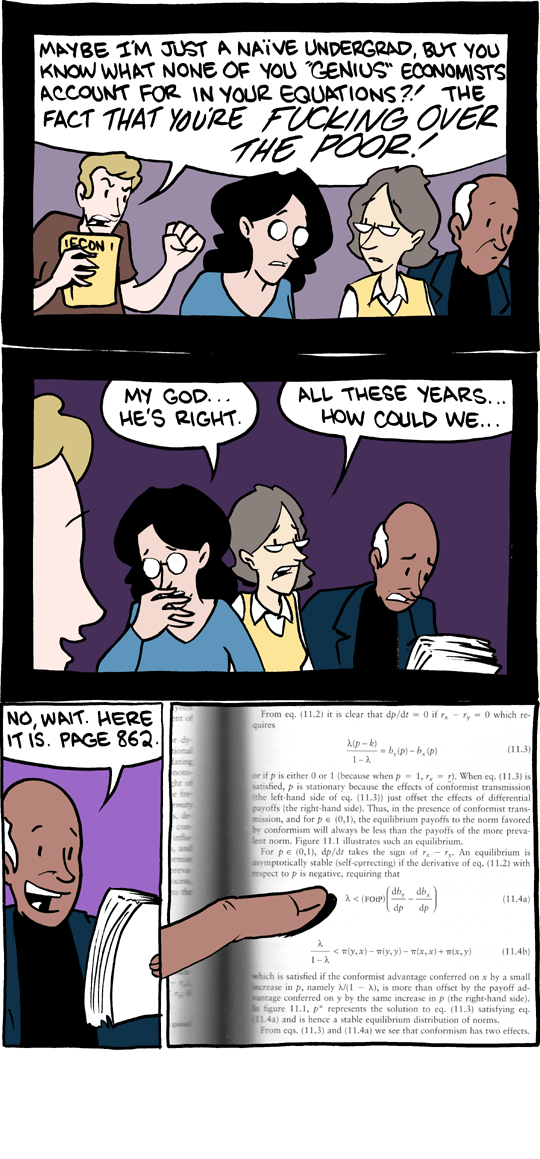2010-11-14
(Redirected from 2060)
Jump to navigation
Jump to search
| 2010-11-14 |
 Title text: 2010-11-14 |
Votey[edit]
Explanation[edit]
| This explanation is either missing or incomplete. |
Transcript[edit]
| This transcript was generated by a bot: The text was scraped using AWS's Textract, which may have errors. Complete transcripts describe what happens in each panel — here are some good examples to get you started (1) (2). |
- [Describe panel here]
- Maybe I'm just a naive undergrad, but you know what none of you "genius" economists account for in your equations: ?! The fact that you're fucking over the poor!
- Iecon
- My god. He's right.
- All these years how could we
- No, wait. Here itis. Page 862
- From eq. (11.2) it is clear that dp/di - ry 0 which quires
- A(p-k)
- (b,(p)-b.(p)
- (11.3)
- 1-).
- or if p is either 0 or 1 (because when P - 1.78 - y). When eq. (11.3)is satisfied, P is stationary because the effects of conformist transmission (the left hand side of eq. (11.3)) just offset the effects of differential payoffs (the right-hand side). Thus, in the presence of conformist trans-mission, and for p e (0,1), the equilibrium payoffs to the norm favored by conformism will always be less than the payoffs of the more preva lent norm. Figure 11.1 illustrates such an equilibrium. For p (0,1), dp/dr takes the sign of An equilibrium
- is asymptotically stable (self if the derivative of cq. 11.2) with respect to p is negative, requiring that
- db,
- db,
- A (foip)
- (11.4a)
- dp dp
- A
- (11.4b)
- Caption: which is satisfied if the conformist advantage conferred on x by a small increase in p. namely NII A), is more than offset by the payoff ad-conferred on y by the same increase in p (the right-hand side). figure 11.1. p represents the solution to eq. (11.3) satisfying eq. 11.4a) and is hence a stable equilibrium distribution of norms. From eqs. (11.3) and (11.4a) we see that conformism has two effects.
Votey Transcript[edit]
| This transcript was generated by a bot: The text was scraped using AWS's Textract, which may have errors. Complete transcripts describe what happens in each panel — here are some good examples to get you started (1) (2). |
- [Describe panel here]
- What a horrible 3 seconds
![]() add a comment! ⋅
add a comment! ⋅ ![]() add a topic (use sparingly)! ⋅
add a topic (use sparingly)! ⋅ ![]() refresh comments!
refresh comments!
Discussion
No comments yet!
